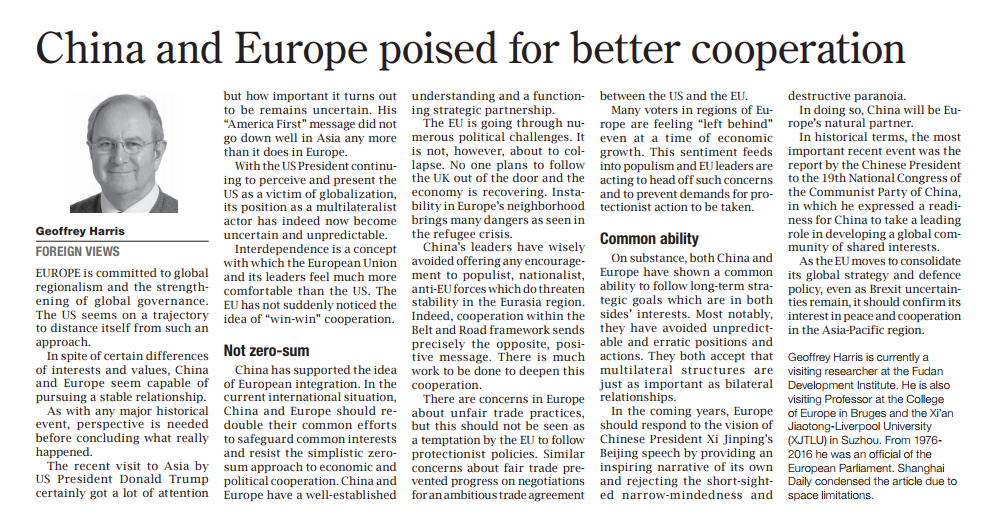Author: Release date:2017-12-12 09:42:06Source:发展研究院英文

Europe is committed to global regionalism and the strengthening of global governance. The US seems on a trajectory to distance itself from such an approach. In spite of certain differences of interests and values, China and Europe seem capable of pursuing a stable relationship. As with any major historical event, perspective is needed before concluding what really happened. The recent visit to Asia by US President Donald Trump certainly got a lot of attention but how important it turns out to be remains uncertain. His “America First” message did not go down well in Asia any more than it does in Europe. With the US President continuing to perceive and present the US as a victim of globalization, its position as a multilateralist actor has indeed now become uncertain and unpredictable. Interdependence is a concept with which the European Union and its leaders feel much more comfortable than the US. The EU has not suddenly noticed the idea of “win-win” cooperation.
Not zero-sum
China has supported the idea of European integration. In the current international situation, China and Europe should redouble their common efforts to safeguard common interests and resist the simplistic zerosum approach to economic and political cooperation. China and Europe have a well-established understanding and a functioning strategic partnership. The EU is going through numerous political challenges. It is not, however, about to collapse. No one plans to follow the UK out of the door and the economy is recovering. Instability in Europe’s neighborhood brings many dangers as seen in the refugee crisis. China’s leaders have wisely avoided offering any encouragement to populist, nationalist, anti-EU forces which do threaten stability in the Eurasia region. Indeed, cooperation within the Belt and Road framework sends precisely the opposite, positive message. There is much work to be done to deepen this cooperation. There are concerns in Europe about unfair trade practices, but this should not be seen as a temptation by the EU to follow protectionist policies. Similar concerns about fair trade prevented progress on negotiations for an ambitious trade agreement between the US and the EU. Many voters in regions of Europe are feeling “left behind” even at a time of economic growth. This sentiment feeds into populism and EU leaders are acting to head off such concerns and to prevent demands for protectionist action to be taken.
Common ability
On substance, both China and Europe have shown a common ability to follow long-term strategic goals which are in both sides’ interests. Most notably, they have avoided unpredictable and erratic positions and actions. They both accept that multilateral structures are just as important as bilateral relationships. In the coming years, Europe should respond to the vision of Chinese President Xi Jinping’s Beijing speech by providing an inspiring narrative of its own and rejecting the short-sighted narrow-mindedness and destructive paranoia. In doing so, China will be Europe’s natural partner. In historical terms, the most important recent event was the report by the Chinese President to the 19th National Congress of the Communist Party of China, in which he expressed a readiness for China to take a leading role in developing a global community of shared interests. As the EU moves to consolidate its global strategy and defence policy, even as Brexit uncertainties remain, it should confirm its interest in peace and cooperation in the Asia-Pacific region.
Geoffrey Harris is currently a visiting researcher at the Fudan Development Institute. He is also visiting Professor at the College of Europe in Bruges and the Xi’an Jiaotong-Liverpool University (XJTLU) in Suzhou. From 1976- 2016 he was an official of the European Parliament. Shanghai Daily condensed the article due to space limitations.
For PDF version: Geoffrey Harris Shanghai Daily 20171205.pdf
Geoffrey Harris Shanghai Daily 20171205.pdf
Information about Fudan Development Institute Visiting Scholar Program
http://fddi.fudan.edu.cn/dongtai/tongzhigonggao/4797.html